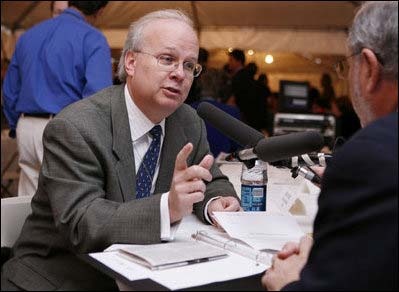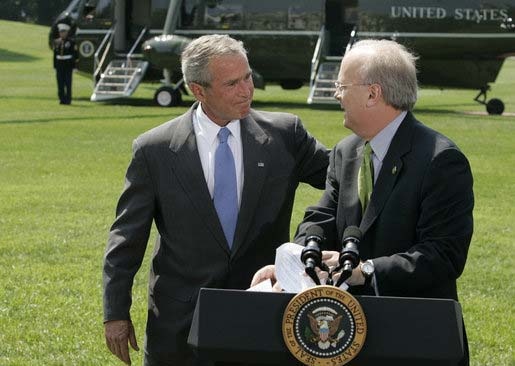Rove, Karl
American political consultant
in full Karl Christian Rove
born Dec. 25, 1950, Denver, Colo., U.S.
 American political consultant and principal architect of U.S. Pres. George W. Bush (Bush, George W.)'s two presidential election campaigns (2000, 2004).
American political consultant and principal architect of U.S. Pres. George W. Bush (Bush, George W.)'s two presidential election campaigns (2000, 2004).Rove was political even as a young child. He pasted campaign stickers for Richard M. Nixon (Nixon, Richard M.) on his bicycle in 1960, and while in high school he volunteered for Wallace Bennett's senatorial campaign. Though he attended the University of Utah and other colleges, he did not receive a degree, and in 1971 he went to Washington, D.C., to become executive director of the College Republicans. Two years later he successfully ran for the post of chairman in a campaign managed by strategist Lee Atwater, an early mentor. During the 1970s Rove was involved with various Republican organizations and candidates, including George H.W. Bush (Bush, George). Becoming involved in Texas politics, Rove worked on the unsuccessful congressional campaign of George W. Bush in 1978 and, in the same year, on the successful gubernatorial campaign of Bill Clements, the first Republican to be elected to the state's highest office since Reconstruction (1865–77). Rove formed his own consulting business in 1981, with a list of clients that included Phil Gramm, elected to the U.S. Senate in 1984, and Tom Phillips, who in 1988 became the first Republican ever elected to the Texas Supreme Court.
In 1994 Rove handled George W. Bush's successful gubernatorial campaign, and he was given much of the credit for transforming Texas from a Democratic to a Republican stronghold, with the party holding all elected state offices by 1999. Rove adroitly managed Bush's 2000 campaign for the presidency (which was won by a narrow margin in the electoral college), limiting press access to the candidate and focusing on a small number of carefully chosen issues. The campaign evoked a vitriolic reaction from Rove's critics, who labeled him both ruthless and vindictive and accused him of underhanded tactics that included intrigue and the spreading of disinformation.
Rove, who was often referred to as “Bush's Brain,” became a senior adviser in the Bush administration and played an integral role in its policy-making decisions. In 2004 he was tasked with organizing the president's reelection campaign. At the time, Bush faced increasing criticism from those who were unhappy with the execution of the Iraq War. Rove again exhibited his skill as a campaign manager in winning Republican votes through “micro-targeting,” a process that involves delivering a specific, narrowly defined message to small subsets of voters and making a concerted effort to deliver those voters to polling sites. Like the contest in 2000, the election of 2004 was exceedingly close, but Bush defeated his Democratic rival, John Kerry (Kerry, John), with a small majority of both the popular and the electoral vote.
 Shortly into Bush's second term, Rove was made deputy chief of staff, a position that allowed him influence in a wide range of affairs, from national security to economic policies. In 2006—amid growing criticism of the Bush administration and Congress, which largely supported the president's measures—Rove was charged with helping the Republican party keep their congressional majority in that year's midterm elections. His efforts failed, however, and the Democrats gained a slight majority in both houses of Congress. Rove came under increasing fire for his alleged roles in numerous scandals—including the leaked identity of a Central Intelligence Agency (CIA) agent and the firings of eight federal prosecutors, which some held to be politically motivated—but he was never formally charged with a crime. In August 2007 he resigned. Following his departure from the White House, Rove became a columnist for Newsweek and worked as a television commentator.
Shortly into Bush's second term, Rove was made deputy chief of staff, a position that allowed him influence in a wide range of affairs, from national security to economic policies. In 2006—amid growing criticism of the Bush administration and Congress, which largely supported the president's measures—Rove was charged with helping the Republican party keep their congressional majority in that year's midterm elections. His efforts failed, however, and the Democrats gained a slight majority in both houses of Congress. Rove came under increasing fire for his alleged roles in numerous scandals—including the leaked identity of a Central Intelligence Agency (CIA) agent and the firings of eight federal prosecutors, which some held to be politically motivated—but he was never formally charged with a crime. In August 2007 he resigned. Following his departure from the White House, Rove became a columnist for Newsweek and worked as a television commentator.- Jersey, flag of
- Jersey Joe Walcott
- Jersey Zoological Park
- Jerusalem
- Jerusalem artichoke
- Jerusalem, Assizes of
- Jerusalem, Council of
- Jerusalem cricket
- Jerusalem, kingdom of
- Jerusalem Post, The
- Jerusalem, Synod of
- Jerusalem, Temple of
- Jervas, Charles
- Jervis Bay
- Jervis, John Bloomfield
- Jerzy Andrzejewski
- Jerzy Grotowski
- Jerzy Kosinski
- Jerzy Kuryłowicz
- Jerzy Neyman
- Jerzy Putrament
- Jerónimo de Zurita y Castro
- Jeseník Mountains
- Jesi
- Jespersen, Otto